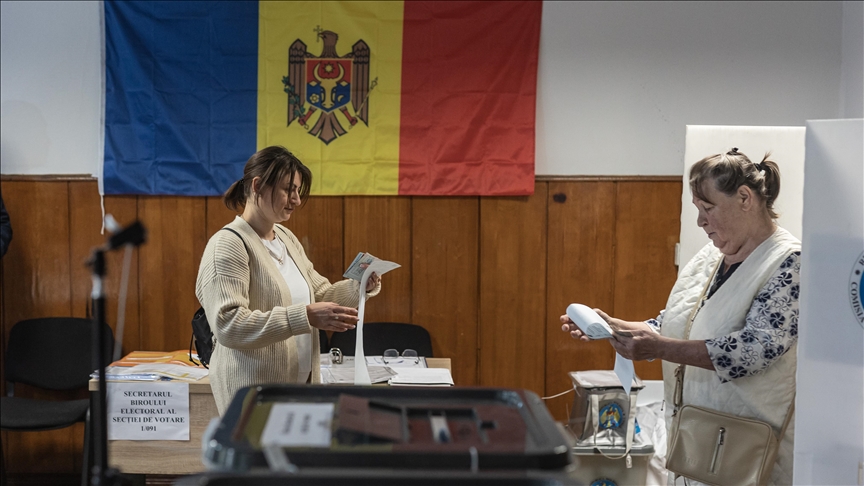Pro-EU party wins majority in Moldova’s parliamentary elections, initial results suggest
Ruling Party of Action and Solidarity wins 50% of vote
 A Moldovan citizen votes during the Moldovan parliamentary elections, which will determine whether the country will continue its approach towards the European Union, in Chisinau, Moldova on September 28, 2025
A Moldovan citizen votes during the Moldovan parliamentary elections, which will determine whether the country will continue its approach towards the European Union, in Chisinau, Moldova on September 28, 2025
ISTANBUL
Moldovan President Maia Sandu’s pro-European party has won a new majority in parliamentary elections, according to the preliminary results announced by the Central Election Commission (CEC) on Monday.
Sandu’s ruling Party of Action and Solidarity (PAS), which has held a parliamentary majority since 2021, won 50% of the vote with 99% of the 1.6 million ballots counted and turnout above 52%.
In the meantime, the pro-Russian Patriotic Bloc, led by former President Igor Dodon, received 24% of the vote.
Among the ruling party's competitors, Dodon had called on the opposition to rally in front of parliament on Monday and claimed Sandu was planning to annul the vote without providing any evidence.
The Alternative bloc, led by Chisinau Mayor Ion Ceban, received 7% of the vote.
PAS is now expected to secure around 55 seats in the 101-seat parliament.
During the voting held on Sunday, Moldova’s Foreign Ministry said it had received reports of bomb threats at several polling stations abroad, describing them as part of Russia’s “assault on the electoral process.”
Separately, Moldova's Information Technology & Cyber Security Service (STISC) reported multiple cyberattacks on the country's electoral infrastructure, including the CEC website, since Saturday.
In an address to the European Parliament earlier this month, Sandu defined the election as the “most consequential” since the country’s independence from the Soviet Union in 1991.
The vote is expected to determine the fate of Moldova’s geopolitical path.
Sandu and the PAS have led Moldova closer to Brussels, securing EU candidate status, alongside Ukraine, in 2022, and opening accession talks in June 2024. A referendum held in October that same year narrowly enshrined EU membership in the country’s constitution.
The period leading up to today's vote has been marked by allegations of Russian interference, particularly by Sandu, who claimed in July that Russia is “investing in multiple political vehicles” to gain influence in parliament.
Russia has denied allegations and accused Moldovan authorities of “dividing citizens” by limiting polling stations in Russia while expanding them across Europe.
Russia has also accused the EU and NATO of plotting to “occupy Moldova” and intimidate Transnistria, a breakaway region of Moldova controlled by pro-Russian separatists since the early 1990s.
Anadolu Agency website contains only a portion of the news stories offered to subscribers in the AA News Broadcasting System (HAS), and in summarized form. Please contact us for subscription options.







